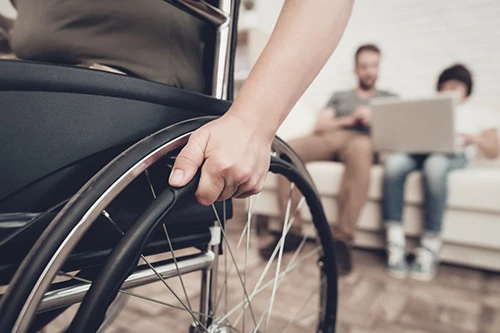Sidewalks are a pathway used daily by most people, whether for jogging, walking to work or other destinations, or simply walking for exercise. Generally, sidewalks tend to protect pedestrians from vehicles.
But sidewalks, depending on conditions, can also be dangerous. Slip and fall (or tripping) accidents sometimes happen, caused by either weather or defects in the sidewalk. But can anyone be held liable for these injuries sustained from the accident?
Causes of sidewalk-related injuries
Any of the following injuries may happen if you’ve had an accident caused by a poorly maintained sidewalk:
- Cracks. Cracks in the sidewalk form very often due to weather changes (especially drastic changes such as going from very cold to very warm temperatures), nature (e.g., tree roots), age, etc. These potentially lead to falling incidents.
- Slippery surfaces. Rain or ice can lead to slick and slippery surfaces.
- Unevenness. Sidewalks can eventually become uneven due to upheaval from weather shifts and the growth of roots.
- Loose bricks (in the case of cobblestone). Over time, bricks and cobblestone may become loose or raised.
- Debris. Toys, trash, natural debris, and other items may cause someone to trip and fall.
- Issues with the construction of the sidewalk. The sidewalk may be constructed poorly because the material used was inadequate or incompatible with the environment. The sidewalk might also be incorrectly installed.
The people at risk of injuries caused by sidewalks and possible injuries
The following types of people are susceptible to sidewalk-related injuries:
- Senior citizens
- Parents with strollers
- People with mobility issues and supportive devices such as canes, wheelchairs, or a scooter
- Children
As for the type of injuries caused by issues relating to the sidewalk, they are:
- Broken bones
- Spine damage
- Sprains
- Traumatic brain injuries
- Neck injuries
- Lacerations
- Bruising
Who can be held liable for sidewalk injuries?
When it comes to injuries from a slip and fall accident, the short answer is that the liability may fall on the property owner of the sidewalk.
Home, rental, and business property owners
Private property owners, even those who own apartment complexes, are considered responsible for the maintenance of the sidewalk(s) that adjoins the property. Maintenance responsibilities include cleaning the sidewalks, removing any debris, draining any water, and repairing cracks, raised slabs, and uneven pavement.
If private property owners neglect their sidewalk, they may receive a warning from the city to repair the sidewalk. Failure to adhere to the notice will typically lead to a fine.
Government entities
The local government may be held responsible for any injuries incurred from a sidewalk-related accident if the sidewalk is adjoining the roads and public property that the government owns. Like private property owners, government entities are responsible for keeping the sidewalks clean and safe for walking. If you’ve been injured in a sidewalk-related accident, you must prove that the government is responsible for your injuries, which is a difficult task.
No sovereign immunity
In Florida, all government entities in the state are held liable for any negligent actions caused by public employees, following the same laws a private citizen would face under similar circumstances.
Florida Statute 268.28 waives sovereign immunity “for liability for torts, but only to the extent specified in this act.” Furthermore, section 5 of this same statute further clarifies the law: “The state and its agencies and subdivisions shall be liable for tort claims in the same manner and to the same extent as a private individual under like circumstances, but liability shall not include punitive damages or interest for the period before judgment.”
Liability can also be pursued underneath the tort law known as Duty of Care. This law imposes that everyone, including the government, has a duty to exhibit care that is expected or is considered reasonable. For instance, the government should maintain roads and public sidewalks, as it is expected of them by the general public. However, acts of care are also expected of the general public. For instance, if the sidewalks are slippery after a heavy rainstorm, pedestrians need to exercise caution when walking.
If you can pursue the government for damages caused by your injuries, you’ll only be able recover up to $200,000 or $300,000, depending on the case.
Proving liability
Proving liability can be considered difficult if you’re not being proactive. To prove that any property owner neglected the repair and maintenance of their sidewalk:
- The property owner was aware or should have been aware of the conditions or the defect in the sidewalk.
- Knows that the sidewalk is dangerous and can lead to injuries.
- The property owner was purposely negligent, which led to your injuries.
- Your injuries can be verified.
Evidence gathering
You’ll need evidence to prove that the sidewalk owner was negligent. You should consider the following:
- Photos. Photos are the most important evidence you’ll need for your case. After all, the condition of the sidewalk can change very quickly. Take photos of the sidewalk’s condition, the injuries you sustained, and where exactly you were.
- Witness statements and complaints. Witness statements are also important to prove liability. If someone saw you injure yourself, you’d want a written statement from that person describing what happened to cause the injury. Additionally, if you consider the government to be at fault, then you’d want to gather records of previous complaints of the problematic sidewalk (which a personal injury attorney can help you with).
- Personal statement. You’ll want your own statement of what occurred at the scene, including the time, date, location, and condition.
- Bills, medical records, and receipts. Copies of medical records and bills you received for your treatment should be collected. Other medical supplies paid for out of pocket should be included.
- Proof of lost wages and pain and suffering. You’ll want written proof that you lost your wages and that your quality of life has diminished.
Consult a personal injury attorney
Proving liability for injuries sustained on a sidewalk, public or private, is a difficult, if not daunting, task. It is advised for you to consult a personal injury attorney to see if you have a case. If so, the attorney will work with you by gathering the required evidence you’ll need to support your claim or lawsuit. They will do all they can to see that you receive the compensation needed to cover lost wages, medical bills, pain and suffering, and other damages.



